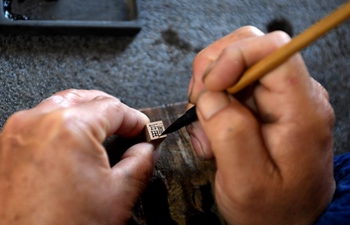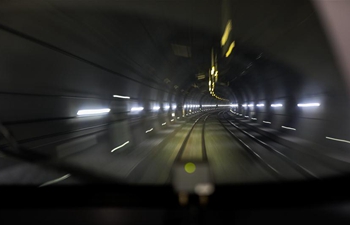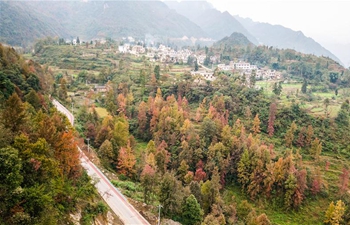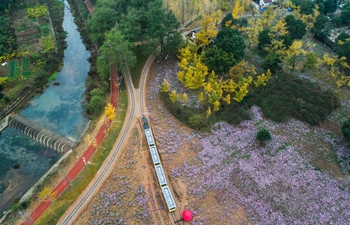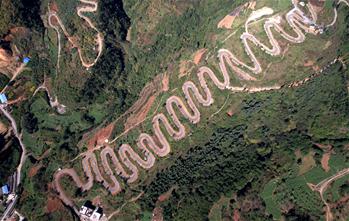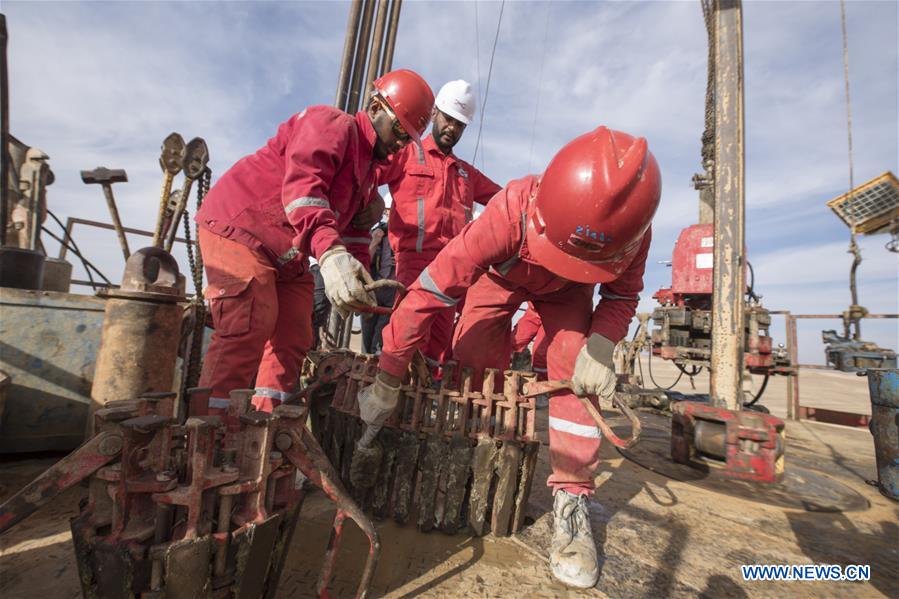
Egyptian workers of China's ZPEC drilling company are seen during the pumping tests for a well in the Western Desert near Egypt's southern province of Minya, Nov. 20, 2018. Producing from 600 to 750 cubic meters of water per hour, the well is one of 30 wells drilled by ZPEC as an initial stage of locating and digging 300 wells to facilitate reclamation of some 120,000 feddans for growing millions of tons of sugar beets. (Xinhua/Li Binian)
by Mahmoud Fouly, Li Binian
MINYA, Egypt, Nov. 23 (Xinhua) -- People were all with smiles while seeing water massively running out of a 500-horsepower pump to cover a pool of sand in the middle of vast desert.
It was during one of the pumping tests for a well dug by China's ZPEC drilling company in the Western Desert near Egypt's southern province of Minya.
Producing from 600 to 750 cubic meters of water per hour, the well is one of 30 wells drilled by ZPEC as an initial stage of locating and digging 300 wells to facilitate reclamation of some 120,000 feddans for growing millions of tons of sugar beets.
The sugar beets are planned to be supplied to a sugar factory that will be built on the outskirts of Minya and is expected to be the largest in Africa and the Middle East, through a partnership between Jamal Al Ghurair Group, owner of Canal Sugar, a giant sugar producer and exporter from the United Arab Emirates (UAE), and Egypt's Al Ahly Capital Holding, the investment arm of the National Bank of Egypt.
ZPEC uses three 40-meter-tall 650-horsepower drilling rigs and other heavy equipments including cranes, tractors, power generators, trucks and vehicles in different locations in the desert, some 50 km western Mallawi district of Minya, to accomplish the project which was started in June and will be finished in two years.
Li Wei, general manager of ZPEC branch in Egypt, said that the company has 11 rigs in Egypt and it plans to bring more of them to join the Canal Sugar project.
"I am very proud of working as a contractor for this huge project. Our deadline is around two years and a half, but I am sure we will complete this project ahead of time," Li told Xinhua near one of the working rigs in the desert.
Since 2016, ZPEC has worked in Egypt's 1.5-million-feddan reclamation national project and drilled 38 agricultural wells for the Egyptian military in the Sinai Peninsula.
Li said that growing Chinese-Egyptian ties and partnerships are behind the increasing number of Chinese companies and businesses operating in Egypt.
Ross Grier, estate manager for Canal Sugar project in Minya, said that he was pleased with the operating wells drilled by ZPEC and that the results of the pumping tests were "a lot better than our expectations."
Grier noted that the total investment in the sugar beet estate and the factory nearly reached one billion U.S. dollars, adding that the constructions will start in about six months and will hopefully be completed within 42 months.
"The estate is going to be about 50,000 hectares. The area of the factory is about a hundred hectares and it will be the largest factory in the Middle East and possibly in the world, for it is going to run 36,000 tons of sugar beet per day," the estate manager said.
The factory will run by February 2022 and it will require about 5.5 million tons of sugar beet per year, with an expected number of workers to be around 1,200 for the farm and 400 for the factory, he said.
While the pumping test was passing successfully, one of the rigs appeared from a distance in another spot of the desert with a high fountain of water coming out of it and splashing in the air, reaching the top of the 35-m mast of the rig.
"The first well we drilled took us more than a month due to the nature of this land, but now we can finish a well from scratch in week," ZPEC site operation manager Amir Mohamed told Xinhua near the giant rig, noting that ZPEC has about 200 workers on the site, mostly Egyptians.
Everyone on the site, including managers, engineers, technicians and helpers wore ZPEC red overalls, white helmets and black safety shoes.
The desistance between each of the first 30 wells is about six km, which needed to open up some roads in the desert to pave the way for moving rigs, power generators, pumps and other heavy equipment from well to well.
"We use loaders, tractors, gliders and water trucks to open up some roads in the desert for ZPEC work. Our work is a must before the drilling process. We've finished about 120 km of six-meter wide roads to connect the first 30 wells and the project will need about 400 km of such roads in total," said Gamal Abdullah, a local subcontractor working for ZPEC in leveling roads and providing vehicles and equipment.
"I have worked with many foreign companies of different nationalities and I have been working with ZPEC for about three years now and I can say it is really one of the best in terms of work system and drilling expertise," Abdullah said.
